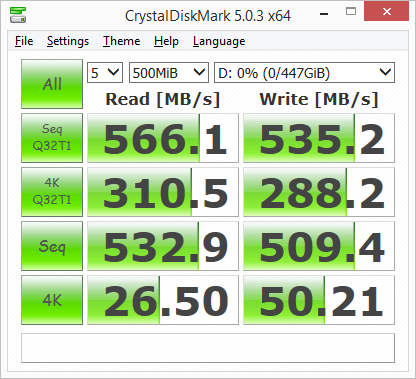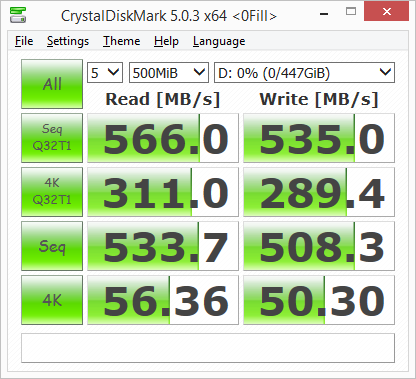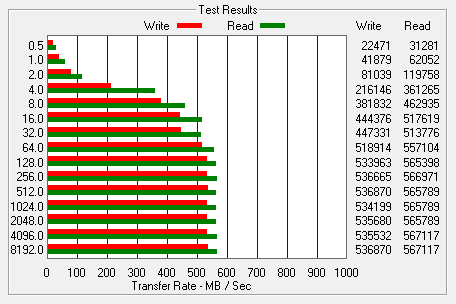The test system used in this review was an HP 8200 Elite. The computer came equipped with an Intel Core i5-2400 CPU, 4GB of DDR3 1333MHz memory, Seagate Barracuda 7200.12 ST3250312AS 250GB SATA 6 Gb/s hard drive, NVIDIA Quadro FX580 512MB PCIe graphics card and an Intel 82579-LM gigabit network card. For the operating system, I installed a fresh copy of Windows 8.1 Enterprise.
To test the performance of Plextor's M7V SSD, I ran a series of benchmarks using CrystalDiskMark 5.0.3, HD Tach RW 3.0.4.0, ATTO Disk Benchmark 2.46, AS SSD, HD Tune Pro 5.00, Anvil's Storage Utilities, Iometer and PCMark 8. For comparison, I've also included test results from the PNY CS1311, OCZ Trion 150, PNY CS2211, Plextor M6V, Crucial BX200, OCZ Trion 100, Kingston HyperX Savage, Crucial MX200, OCZ Vector 180, Kingston BX100, Samsung 850 EVO M.2, Samsung 850 EVO mSATA, AMD Radeon R7, Silicon Power Slim S80, Samsung SSD 850 EVO, OCZ ARC 100, SanDisk Ultra II, Kingston MX100, SanDisk Extreme Pro, Samsung SSD 850 PRO, Plextor PX-256M6S and Toshiba Q Series Pro.
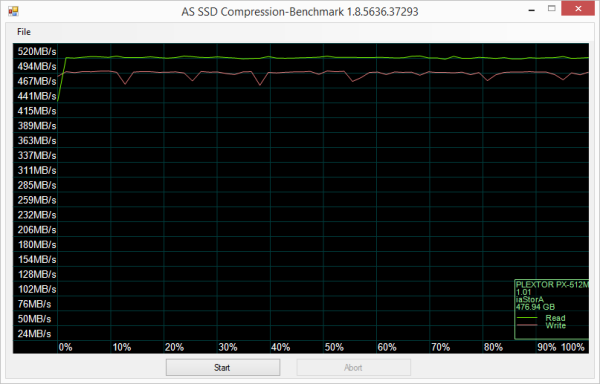
As I mentioned earlier, the PNY is based on Marvell's 88SS1074B1controller chip. Looking at the screenshot above, you can see that it performs equally well with both incompressible (0%) and compressible (100%) data.
CrystalDiskMark 5.0.3:
First, I ran a few quick tests using CrystalDiskMark. This benchmark tool measures the performance of a storage device by testing its sequential read and write speeds as well as its random read and write speeds using blocks 512K and 4K in size.
According to Plextor, the 512GB M7V is capable of reading at 560 MB/s and writing at 530 MB/s when connected to a SATA 6 Gb/s port. While the drive performed better than expected when reading, it came up a bit short in CrystalDiskMark's sequential write speed test.
The M7V performed equally well when using highly compressible 0x00 (0 Fill) data. This time around, the drive was able to read at 561 MB/s and write at 529.2 MB/s.
HD Tach RW 3.0.4.0:
Next, I used HD Tach to test the M7V's read, write and burst speeds as well as its seek times and CPU usage.
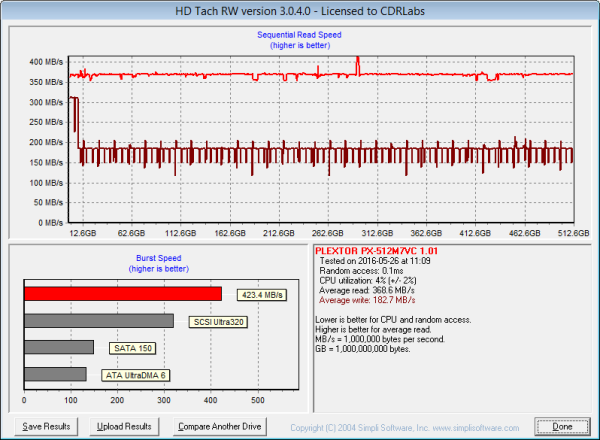
Looking at the screenshot above, you can see that the M7V had average read and write speeds of 368.6 MB/s and 182.7 MB/s respectively, as well as a burst speed of 423.4 MB/s. The screenshot also shows that, like most other TLC-based SSDs, the M7V uses some sort of SLC caching. The drive starts writing at about 310 MB/s and then drops to about 190 MB/s when the write operation exceeds the size of the cache.
ATTO Disk Benchmark 2.46:
I also used ATTO Disk Benchmark to test the M7V's sequential read and write speeds. The tests are run using blocks ranging in size from 0.5KB to 8192KB and the total length set to 256MB.
When tested with ATTO, the M7V's read speeds topped out at about 564 MB/s and its write speeds at 536 MB/s.



